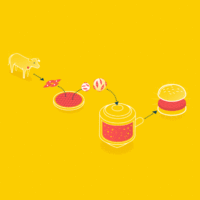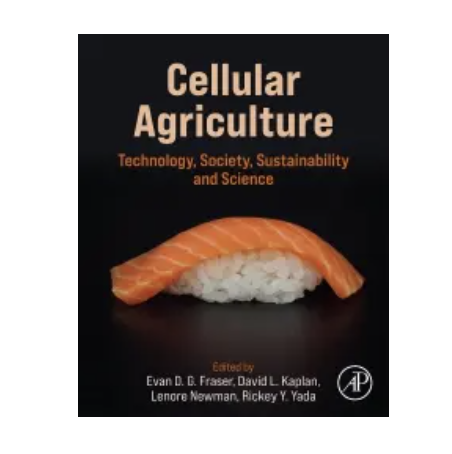- Overview
- Background
- Criticism
Overview
Will cultured meat actually be better for the environment than “regular” meat?
Back in 2008, no data existed about the environmental impact of cultured meat. To fill this gap, New Harvest funded independent research to investigate the claim that cultured meat will have a better environmental footprint than meat from animals. After circulating a request for proposals (RFP), we picked a researcher named Hanna Tuomisto out of the University of Oxford to conduct the world’s first life cycle analysis of cultured meat.
This research generated the first citable data about the potential environmental impact of cultured meat, published in a milestone peer-reviewed publication.
The media surge associated with the numbers from the paper helped attract more people to cultured meat as an area of research and stimulate further life cycle assessment work.
As of April 2021, the paper has over 22,000 views and 230 citations.1
1Metrics from here.
Criticism
Note: The following is excerpted and adapted from our old website, now available as a blog post.
This study has received much criticism. The main criticism is that since no commercial cultured meat facility existed at the time of Hanna’s research, the paper is “a fairly complex thought experiment.” In other words, the paper is based on a number of questionable assumptions including:
- The use of Cyanobacteria hydrolysate (an algae that can be grown in large ponds) as the nutrient and energy source for muscle cell growth. It remains unproven if meat cells can even feed on this nutrient source.
- That “as cells produce heat during the growth, additional energy inputs in heating of the reactor are not required.”14 Many researchers have pointed out that this is an extremely unlikely scenario.
14Excerpted from the methodology and data section of Hanna’s paper
Further research
Hanna continues to build on her 2011 paper, addressing criticisms and revising assumptions, independent of New Harvest. She published additional research in 2012, 2014, and 2019.
As the industry and science of cultured meat advances, researchers are able to build more accurate models to assess environmental impact.
This initiative kickstarted a data-driven conversation about the environmental impact of cultured meat and provided a starting point for further life cycle assessment research.
Updates
October, 2014 – Hanna amends the initial paper to address criticisms about methodology.
June, 2011 – Peer-reviewed publication is published in Environmental Sciences & Technology.
January, 2011– Publication is submitted for peer-review
August, 2008 – New Harvest circulates a request for proposals (RFP) for LCAs about cultured meat and picks a team at the University of Oxford, led by Hanna Tuomisto.
Collaborators
This research was conducted by Hanna L. Tuomisto at the University of Oxford, and M. Joost Teixeira de Mattos at the University of Amsterdam.
See More Initiatives

Artificial Intelligence and Machine Learning in Cellular Agriculture
Cost and scale are major blockers to cellular agriculture's success, but they are complex technical and economic challenges. Artificial intelligence (AI) and machine learning (ML) techniques could help to accelerate much of this work, but there is very little public literature on the various applications and benefits. Given the potential exponential impact of AI/ML, New Harvest and Alberta Machine Intelligence Institute (Amii) launched the AI in Cell Ag Initiative.

Safety Initiative Phase III: Precompetitive Collaboration on Safety Research and Methods Development
The Cultured Meat Safety Initiative (CMSI) is a joint initiative between New Harvest and Vireo Advisors aiming to address critical technical, methodological, and informational challenges related to evaluating the safety of cultured meat (CM) products.
CMSI involves the convening of diverse stakeholders, including industry, governmental scientists, regulators, academic researchers, and others. Gaining such varied perspectives advances public knowledge and the practice of food safety for CM products by identifying and addressing data gaps. Research conducted to develop data and methods build the necessary support elements for the emerging ecosystem, which can raise regulatory and consumer confidence, support industry efforts toward commercialization, and improve the efficacy of evaluation processes of regulatory safety reviews.
Building on progress from Phase I and Phase II of CMSI, New Harvest and Vireo Advisors are now working to convene diverse stakeholders to create the infrastructure for shared knowledge, methods, and data that address the priorities identified in Phase I and II. Our long-term goal is to coordinate and launch regional efforts to develop and validate analytical methods for CM safety analysis and use these methods to generate datasets that can be made publicly available to support transparent food risk assessments and policy-making processes.

The Foundational Cellular Agriculture Textbook
Cellular Agriculture: Technology, Society, Sustainability and Science was designed to be the go-to reference for everyone in cellular agriculture - the textbook found in every company’s office, in every university lab, and in every aspiring student’s backpack.
The text provides a state-of-the-art review of cellular agriculture technologies, presenting foundational information with practical application insights. There are chapters on regulatory and policy issues, as well as reviews of the sustainability challenges of alternative proteins.
It is the first resource of its kind to take a practical approach to review the design, feasibility, and implementation of cellular agriculture techniques. With additional chapters on life cycle analyses and ideal transition scenarios, this book provides a resource for aspiring technology developers and academics alike seeking evidence-based assessments of the industry and its disruptive potential. The textbook was written by industry and academic experts for a balanced perspective of the field today and to inspire and shed light on a path forward.

